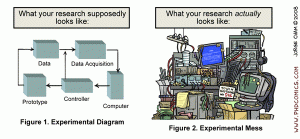
Hello everyone,
It’s been a while since my last post. Between that post and this post, I had an epic trip to Europe, got to think about things other than my thesis for a few days, and relaxed. Now that my inbox is caught up to date and I have had my first meeting with my supervisors since I got back, I think it’s time that I get back to blogging.
And this time, I am hoping it’s somewhat helpful to the incoming grad students. If you are not a prospective grad student for this year, but thinking about grad school at UBC, I just found out that Ambrose Chan, my labmate and the president of MEGA(Mech Eng Grad Association — join our facebook here 😀), is featured on a recruitment video – woot, woot! Ambrose, you’re a super star!
If this video convinced you enough, or you didn’t need convincing in your decision to come to UBC, then this post may be of help to you. Because this course is on choosing courses.
I actually came across the same kind of questions from multiple prospective graduate students regarding courses, that I think it’d help you out in the registration process. I remember going through this process myself a couple of years ago as a prospective MASc student, so I will mainly focus on that. This is an improved version of answers I gave to a prospective student recently by the way (sorry, super lazy over here).
Alright, here we go.
First of all, I am guessing all of you are familiar with the Program Guide and Registration page on the mech.ubc.ca website. If not, it’s pretty helpful, so give it a try (http://mech.ubc.ca/graduate-students/program-guide-and-registration/). You’ll find out soon enough that you need to get at least 30 credits to get your MASc. It’s a bit confusing at first, because… of the 30 credits, your thesis counts as 12 credits. It’s also named under this weird course number, MECH 599B. Yes, you need to enroll in it to let the world know that you’re in the UBC Mech master’s program — and no, they don’t give you 12 credits per year for your thesis, so there’s on advantage of staying longer to finish your master’s. On top of that, you have this mandatory seminar course called MECH 598 that everyone need to enroll in. Unlike most courses, which gives you 3 credits per course, this course unfortunately gives you 2 credits. Why is it unfortunate? Well… to do the math, 30 – 12 credits is 18, and 18 is quite nicely divided by a bunch of threes (six of them to be exact), but 18 – 2 is 16 which isn’t evenly divided by a bunch of threes. So this means that, excluding the 12 credits you automatically get as a master’s student, you end up enrolling in this mandatory seminar course, and are left to fill up 16 credits with courses. Here at UBC, we usually get 3 credits for a 3 hour class commitment per week (I think it’s true for most North American university credit systems). So you see why things that nicely divide by threes are kind of important…
That means you need to take 5 (if you happen to take four 3-credit courses and one 4-credit course) to 6 courses throughout your entire master’s program in order to meet the credit requirements.
So, I took six 3-credit courses throughout my master’s, but spread out mainly across my first year master’s. I know that in undergrad, people are used to taking five to six courses per term. So you are probably thinking, why not get all the courses over with in the first term? Yea… I don’t actually know anyone who has done that. I think taking more than three courses is a bit too much in grad school – although taking four is doable. I am not saying that to mean the course load is super heavy for grad level courses (it’s not that bad imho), but I am saying that because you end up working on and caring more about research than course work. Sometimes courses come with course projects, which can take up whatever time they take up (sometimes quite a lot, sometimes not at all). So I recommend doing the 3 courses per term in first year type schedule. I found that the seminar course (MECH 598) actually take a lot out of you on the second term of your first year because a lot of people stress out for weeks preparing for presentations for the seminar. I wouldn’t recommend taking any more than three courses during the first W2 term, but that might just be me.
On the courses I took.. I took three courses the first semester, two courses the second semester, and one course during my second year – if I remember correctly.
3 credits – CPSC 505 (Image), First year W1 term
3 credits – PSYC 545 (Stats), First year W1 term
3 credits – INDS 502 (Ethics), First year W1 term
3 credits – CPSC543 (User Interfaces), First year W2 term
3 credits – MECH520 (Sensors & Actuators), First year W2 term
3 credits – MECH522 (Controls), Second year W1 term
2 credits – MECH 598 (Seminar Course), First and second year, W1 and W2 term
So, as you can probably tell, I took quite a few courses outside of Mech. Part of the reason is that my research project is highly interdisciplinary. So I was able to find courses outside of Mech Eng that were quite relevant to my study and I think it worked out quite nicely for me that way.
Another thing to note is that, unlike undergrad course registration process where you make your decisions on courses as you like, in grad school it’s always recommended that you speak with your supervisors about your chosen list of courses. So, before registering for your courses and sticking by them, you should just send your supervisor an email saying “Here are the courses I would like to take. What do you think?” I think grad school is a bit more closed-loop with you and your advisors in the sense that they are like your research parents – them parenting your way through your research, including your course selections.
And it’s also good to contact people from your lab regarding the kind of courses that they have taken. That way, you know what you are getting into – i.e., you can filter out the courses that are highly discouraged by your future labmates due to hard marking professor, not an interesting course etc.
That’s it for now. I hope this helps, and happy enrolling everybody! 😀
 Follow
Follow
 Time spent making choices are deceivingly exciting yet seriously dreadful.
Time spent making choices are deceivingly exciting yet seriously dreadful.

 Sometimes when you find yourself hesitating to make a decision, that’s because you can probably live with any of the available options (i.e., too much freedom on your hands). If there was a clearly bad choice, and a clearly good choice, you won’t have to ask too many questions before you make your decisions isn’t it?
Sometimes when you find yourself hesitating to make a decision, that’s because you can probably live with any of the available options (i.e., too much freedom on your hands). If there was a clearly bad choice, and a clearly good choice, you won’t have to ask too many questions before you make your decisions isn’t it?
